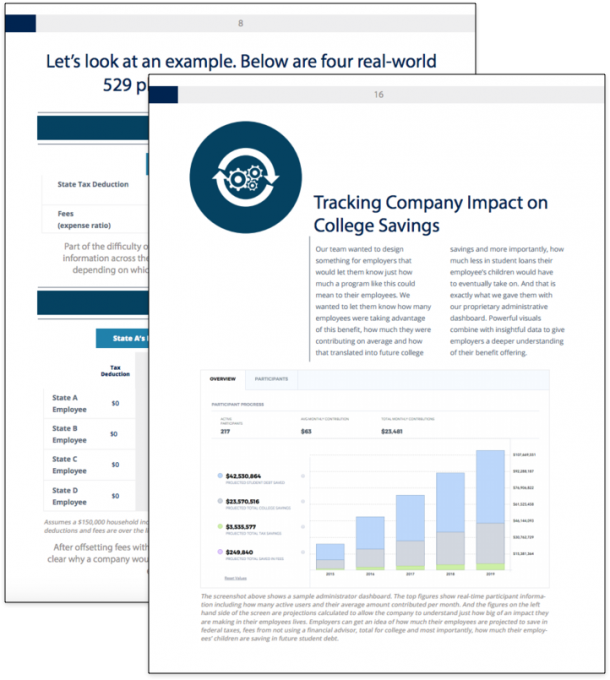Highly compensated employees, safe harbors, nondiscriminatory testing, auditing. When HR managers get pitched financial products for their employees, they likely think of the painful processes involved in rolling out and keeping up with a 401(k). But employer-sponsored 529 college savings plans are much different.
Very Different than 401(k)s
Since 401(k)s are group plans, the IRS has mandated that top heavy and ADP/ACP testing must be done on an annual basis for compliance purposes.[1] Naturally, when HR managers hear that they can roll out a college savings plan for their employees, they get dreadful flashbacks to these audits.
That’s the problem with referring to the colloquial term ‘employer-sponsored 529 plans’ when approaching HR managers. Although the employer is making a college savings benefit available to their employees, they are not ‘sponsoring’ it like they do with other group plans. Instead, they are merely helping facilitate a payroll deduction from their employees’ paycheck to the investment option of the employee’s choosing.
Compliance is a Breeze
Unlike 401(k)s assets, 529 plan college savings accounts opened by employees are individually held, thus the employer is relieved of pooled-asset requirements and fiduciary responsibility (i.e., ERISA).[2][3] This means rolling out an ‘employer-sponsored’ 529 plan does not entail many of the headaches HR managers usually associate with financial products. There is no Form 5500 filing or nondiscriminatory testing. Employers can simply offer this powerful benefit without creating additional work for themselves.
On the Horizon
That’s not to say there won’t be regulation instituted down the road, however. Employer-sponsored 529 plans are still in their infancy in terms of popularity. Just like anything else, as they become more commonplace, they will receive closer examination.
For example, the Supreme Court recently ruled that employers have a “continuing duty to monitor” investment fees within their 401(k) plans.[4] Corporations that currently roll out employer-sponsored 529 plans generally just partner with their home-state’s 529 plan. However, if the plan they offer employees does not provide tax-deductions and the investments carry high fees, one can see how this could potentially open up a well-intentioned employer to litigation. This means employers in the future will have to perform much more due diligence when offering this benefit. In fact, the status quo of partnering with a single 529 plan might be rendered obsolete.
That’s why we at Gradvisor chose to become a Registered Investment Adviser (RIA) as opposed to a normal broker-dealer. We are held to a fiduciary standard meaning we always put your employees interests first. We carry 529 plans from every available state, removing the restrictive practice of offering your employees a single option. We also continually monitor investment fees for you, so you can rest assured that your employees are getting low-cost investments and personalized, unbiased advice.
[1] SHRM, Clearing Annual 401(k) Compliance Test Hurdles, http://www.shrm.org/hrdisciplines/benefits/articles/pages/cms_017663.aspx
[2] New York Advisor-Guided 529 Plan, FAQs for Financial Advisors, https://www.ny529advisor.com/blobcontent/34/31/1323381702442_529-GROUPQA.pdf
[3] PlanSponsor, Tuition Troubles, http://www.plansponsor.com/print.aspx?id=6442455937
[4] Los Angeles Times, Employers must monitor 401(k) fees, Supreme Court rules, http://www.latimes.com/business/la-fi-court-edison-401k-fees-20150519-story.html


